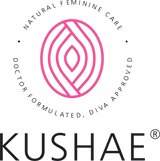This article is for informational purposes only. It is not, nor is it intended to be, a substitute for professional medical advice, diagnosis, or treatment and should never be relied upon for specific medical advice.
In the post-COVID world, there's still a lot of talk about antibacterial soap, how effective it is at protecting us from germs, and how safe it is to use on the vulva. While it might sound like a good option for washing your hands, can you, and should you use it to clean your vulva?
Keep reading to learn why antibacterial soap may not be the best choice, the potential risks, and the importance of maintaining a healthy vulva.
Should You Use Antibacterial Soap At All?
Regular soap and water are usually all you need to help you keep your hands clean and remove most bacteria from your hands and skin. According to the (CDC), there is no evidence that antibacterial soap is more effective than regular soap at preventing illness or reducing infection spread outside of hospitals. As a matter of fact, long-term use of antibacterial soaps or cleansers on the skin can lead to antibiotic resistance.
Why You Should Not Use Antibacterial Soaps On Your Vulva
Disrupts Your Vulva's pH Balance
Using antibacterial soap to clean your vulva can disrupt your vulvas' pH balance by killing the good and the 'bad' bacteria in your vagina - increasing your risk of developing vaginal infections such as bacterial vaginosis (BV) or yeast infections.
In addition, antibacterial soap contains active ingredients like triclosan; as an 'antimicrobial compound, triclosan can be found in many products, such as clothes, mouthwash, toothpaste, and more - making it almost impossible to avoid. Long-term exposure to triclosan can lead to 'endocrine disruption, antibiotic resistance, liver fibrosis, and liver tumorigenesis.'

It Can Irritate Your Vulva's Skin And Cause Dryness
The vulvar skin is sensitive and incredibly absorbent, making it more prone to dryness and irritation. The harsh chemicals found in antibacterial soaps can strip away the vulva's natural ability to stay moisturized, leading to dryness, itching, and discomfort.
People with sensitive skin may develop allergic reactions from using antibacterial soaps on their vulvas, due to the preservatives, fragrances, and other toxic ingredients found in antibacterial soaps; it's best to avoid them if you have sensitive skin. An allergic reaction may appear as itching, redness, swelling, or a rash on or around the vulva.
What Should You Use To Clean Your Vulva?
When taking care of your vulva, Never use antibacterial soaps to clean it; instead, always opt for gentle, non-toxic, and pH-balanced feminine hygiene products like Kushae. Our vulva-loving products are backed by science and powered by Mother Nature because your health matters to us.
Whether you’re here to solve a problem – like musty odors, dryness, rubbing skin, ingrown hairs, or infection – or to create a daily vulva care regimen… We’ve been there. And we’ve got your natural solutions – from a gentle boric acid suppository to a luxurious 2-N-1 vaginal wash.
So are you ready to start a healthy vulva routine? Take the Kushae quiz to discover the perfect hygiene routine for your vulva. The Kushae quiz is the only feminine health assessment – backed by 20+ years of board-certified gynecological experience.
References: https://www.tandfonline.com/doi/full/10.1080/19490976.2018.1546521

















